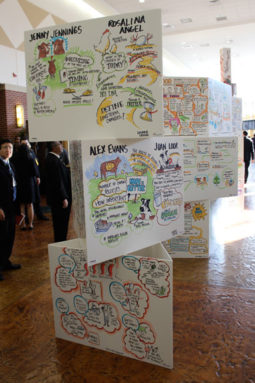To improve on last year’s symposium, Pearse Lyons, founder and president of Alltech, and his team thought of the 2012 symposium as “boring.” “We never review what we did right,” Pearse Lyons said. “Last year’s symposium was fantastic, but we wrote down one word and only one word. We should take the approach that last year’s [symposium] was boring. Start again and create something different.” This year’s symposium was held May 19-22 in Lexington, Kentucky. Nearly 2,400 people attended the event from 72 different countries.
Alltech focused on making this year’s symposium more interactive and included additional breakout sessions, such as branding, crisis management and entrepreneurship.
The 2012 symposium focused on life in 2050, and this year’s symposium decided to take a look at the nearer future.
“This year was to pull that a little bit closer,” said Mark Lyons, vice president of corporate affairs for Alltech, “and think what are the things we must do, what are the imperatives, and what are the decisions that must be made now. If we make those we will have a sustainable future by 2020.”
This article features online exclusive photos that didn't appear in the print issue.
The theme
“Glimpse” was the theme for this year and the acronym stood for:
- Government
- Losses
- Infrastructure
- Markets
- Politics and policies
- Science and innovation
- Environment

Having a “glimpse” into what 2020 could look like, participants went to different breakout sessions to see what they could do differently.
Sessions included algae opportunity, regulatory, success begins and ends with fertility, life sciences and others. The symposium did not just focus on feeding animals but how everything comes together for the larger picture of agriculture.
Nutrition topics
Re-imagining nutrition first looked at a study done by Alex Evans and associates from University College in Ireland. This study looked at how the dam was fed and how that would affect her offspring, specifically through reproduction.
Evans was interested in seeing the number of antral follicles present in offspring once they reached puberty. The dams on a restricted diet had offspring with fewer follicles; fewer follicles can lead to poor reproductive performance and high blood pressure.
“Managing animals to be healthy and have high fertility is a life-long task,” Evans said, “not just relevant at or during the short postnatal period.”
Juan Loor, associate professor at the University of Illinois, focused on the dairy cow. He highlighted the importance of the dry period on the health and performance of the cow during lactation.

He believes that:
- We need to continue to fine-tune diets with specific nutrients such as fatty acids and amino acids. Feeding specific nutrients will lead to higher feed efficiency.
- More research is needed to understand nutrition and programming better.
- A better job needs to be done at getting knowledge of specific cells.
- Everything needs to be put together in a system view.
Presentations were also given that focused more on beef cattle, swine and poultry. Once the speakers were finished with their presentations, they became part of a panel that accepted questions from the audience.
“We need to see the effects on the whole animal, not just specific pathways,” said Roselina Angel of the University of Maryland’s Department of Animal and Avian Sciences.
Loor agreed with Angel: what scientists look at needs to be broader.
“We need to pay attention to every stage of life,” Loor said.
Crisis management
Once the nutrition session was complete, a crisis management session began. This session focused on the value of your reputation, what a crisis looks like and how to handle one.
Gavin Megaw, director at Hanover (an independent consulting firm in the United Kingdom), explained how many organizations see reputation management as a hassle. However, companies don’t own their reputation; consumers and social media do, Megaw said.
Companies can face different types of crises:
- Natural: flooding, earthquakes, etc.
- Abnormal: data issues, information, cyber security, etc.
- Normal: personnel issues, supply issues, etc.
Megaw gave several pointers for people when they are dealing with a crisis and the company’s reputation.
- Let the facts drive your reputation; don’t be in a guessing game.
- Get your news on as quick as possible to reduce the number of times it will appear on the news.
- Trust is important.

Pearse Lyons dropped by the session to give his own personal statements on crisis and crisis management.
“We are in the business of selling dreams, and a crisis can come through and destroy it without a [crisis management] plan,” Lyons said.
Milk production in 2020
Aside from the breakout sessions, a discussion dinner was held to discuss milk yields in 2020.
Maury Cox, executive director of the Kentucky Dairy Development Council, and Peter Darlington, environmental adviser to the agriculture industry in the United Kingdom, both said farmers need to speak out.
Cox said that milk prices will remain low “until dairymen take over their cooperatives and start doing it differently.”
“We shouldn’t be frightened to stand up and say to the consumer we are actually doing a good job with our footprint and our environment,” Darlington said.
Frank Mitloehner, professor at University of California –Davis, said farmers need to embrace the carbon talk because “they are really good at it.”
“You have to tell your story and you are not doing a good job of that,” Mitloehner said.
“The public thinks your efficiencies are the opposite of what [dairy farmers] really do. They think your efficiencies translate to environmental pollution. That’s what the public thinks and you’ll have to do a better job convincing them of the opposite.”
Charles Crave, a dairy farmer from Wisconsin, reminded the group “there is always something we can do to improve.”
Bill Rowell, a dairy farmer from Vermont, explained his view on the dairy farmer and the assets available to them.
“I don’t know anything more efficient than a dairy farmer, more ingenious, more patient,” Rowell said. “If you have an asset, you can’t afford to misuse it. You have to make the best use of it with every opportunity you can.”
Algae: A new reality
The closing of the symposium highlighted algae, dealing with a new reality and Mark Lyons’ vision for the future.
Algae produces three-quarters of the oxygen on earth. Could algae become the fuel of the future? Possibly, but right now the cost is too high to make it feasible.
Algae is already being used in skin care treatments, and one building in Germany is using algae panels to provide energy for their building.
Becky Timmons, global director of applications research and quality assurance for Alltech, said: “People don’t just want food; they want it to be safe, nutritious and traceable.”
Timmons highlighted the importance of DHA, an omega-3 fatty acid, in the human diet. DHA aids in brain and eye development, heart health and immunity, in humans and animals. DHA is normally found in fish products. The recommended level of DHA in the diet is 300 to 600 mg per day.
Producing algae and doing research to see how DHA holds up in the rumen is something Alltech is looking into. DHA in a recent study made it through the rumen without any issues.
Understanding how algae and DHA work together may lead to innovations in getting DHA to consumers through sources other than fish.
Patrick Wall is a professor of public health at the University College Dublin. He also is involved in several food safety organizations and committees. He looked at the importance of food safety and public interaction.
“It takes millions of dollars to build a brand, but one instance to ruin a reputation,” Wall said.
Dealing with a food crisis is not just about safety for consumers; it is about emotions such as fear, stress and greed, Wall said.
What can people do to avoid a food crisis? Wall said people can protect their own link in the food supply. Ingredients for success, he said, include:
- Confidence
- Competitiveness
- Creativity
- Cooperation and collaboration
- Compliance
- Control your supply chain
Mark Lyons moved to China in January 2012. He has been building relationships and learning about the culture of a country where Alltech believes its largest market will be in 2020.
He explained that milk, meat and egg consumption will increase another 50 percent by 2030, when 70 percent of Chinese people will live in cities.
“In China, anything is possible, but everything can be difficult,” Mark Lyons said.
The media in China tables many celebrity stories to highlight agriculture and food safety in the media.
Alltech has created a Chinese dairy training facility to educate farmers on how to be more efficient. Mark Lyons believes that now is the time to be in China – now is the time to make an impact.
“Followers are worried about money,” Mark Lyons said. “Leaders change things and want to change things.”
What word will be used to describe the company’s 2013 symposium? Only time will tell but attendees will experience another new take on the annual symposium in 2014 from May 18-21 in Lexington, Kentucky. PD
PHOTOS
Pearse Lyons' passion is Alltech, but he also loves the arts. Throughout the symposium talents were exhibited such as singing, dancing and drawing.
PHOTO 1: Each of the breakout sessions had an artist drawing the highlights on a canvas.
PHOTO 2: During the opening and closing sessions pianists played and singers sang “If I Ruled the World.”
PHOTO 3: Dancers danced for symposium attendees every afternoon once the sessions were finished.
PHOTO 4: Mark Lyons, left, and Pearse Lyons, right, talk to each other at the closing of the Alltech Symposium about the future for Alltech. Photos by Ariel Waldeck.




